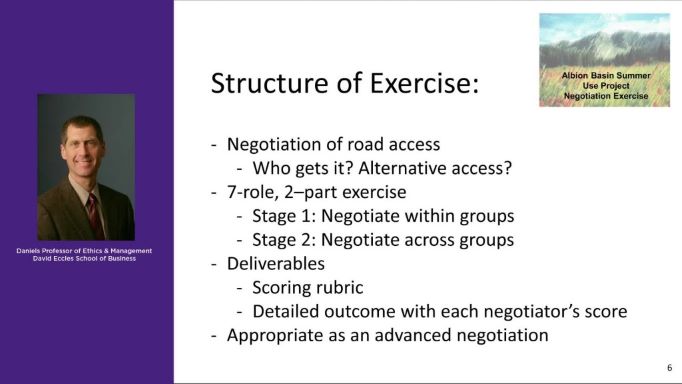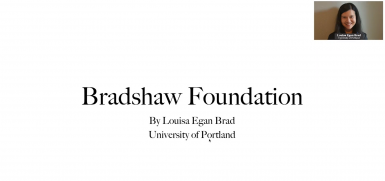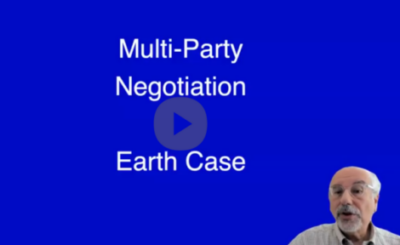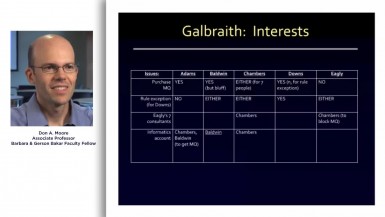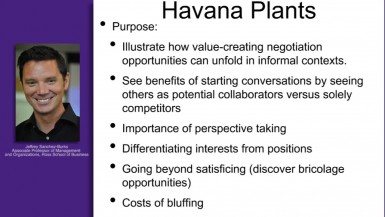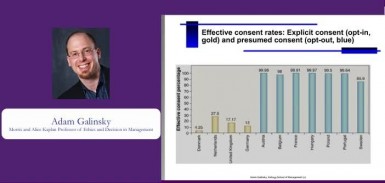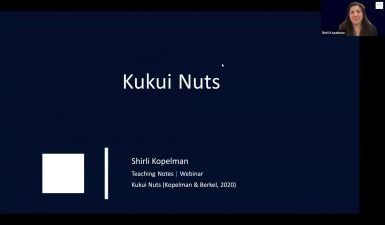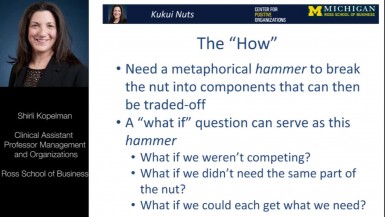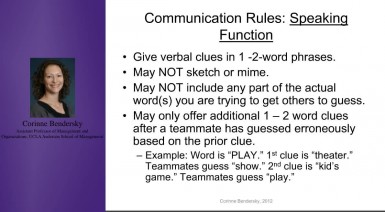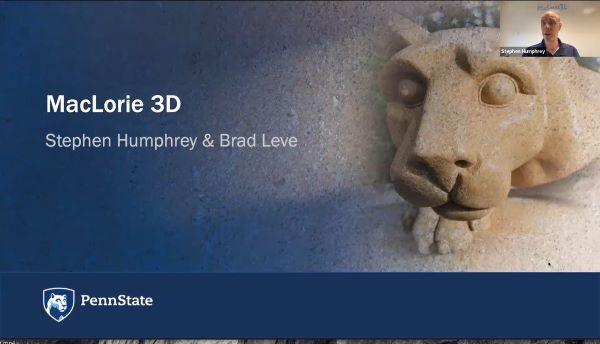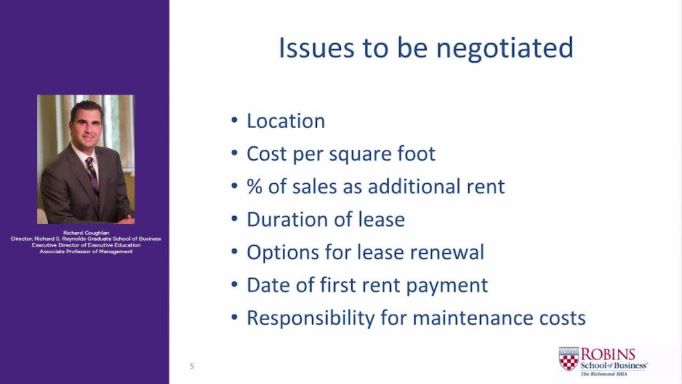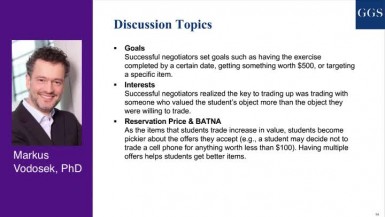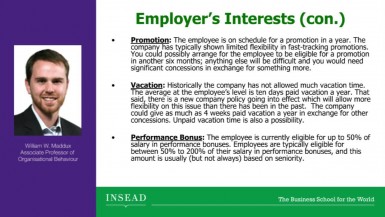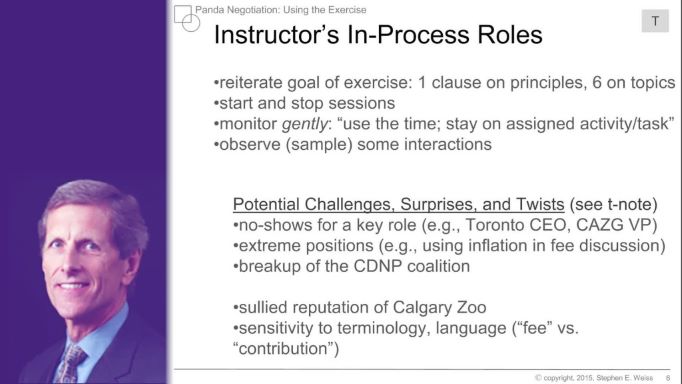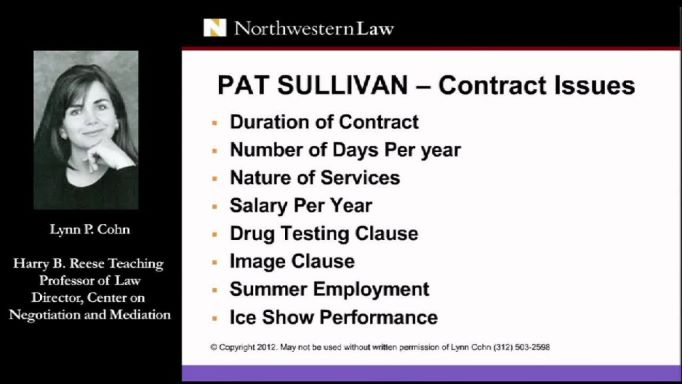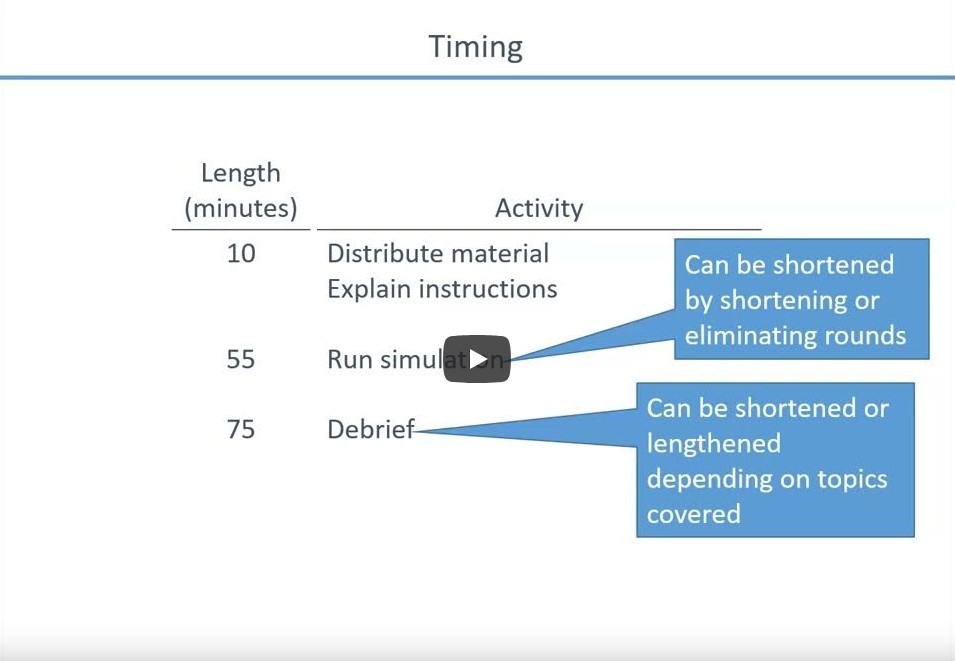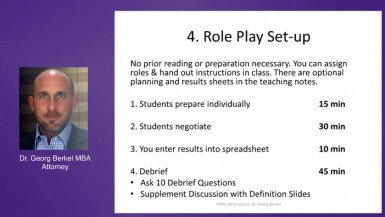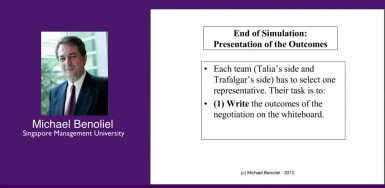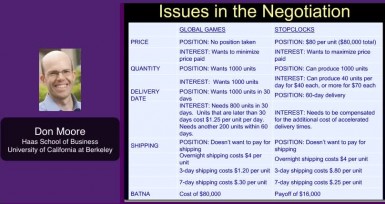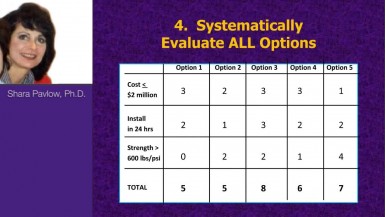Webinars
-
Albion Basin Webinar
The Albion Basin is a watershed located within the Wasatch Mountains east of Salt Lake City, Utah. This negotiation exercise calls on multiple parties (7 of them) with interests in the Albion Basin to try to reach an agreement concerning sustainable land use of the basin. The exercise challenges negotiators to identify and value issues and options. Directions walk students through how to develop a scoring sheet that values and prioritizes the issues for their role. (Raiffa’s Formal Analysis, 1982). During preparation participants meet with same-role others. The negotiation can be run with individuals or teams representing the 7 parties.
-
Aussie Air Webinar
This is a quantifiable, 5-party, dynamic negotiation exercise modeled on the takeover attempt of Qantas Air by a Macquarie Bank-led consortium. The purpose is to demonstrate how negotiations are influenced by social context: new information, changing interests, and shifting coalitions. To simulate these social context effects, the exercise is divided into three general meetings of all the parties broken up by 2 private or small group conferences. Exercise Available Here!
-
Bradshaw Foundation Webinar
This is an excellent exercise for raising issues of ethics and representation in negotiation. It is a one-on-one, qualitative negotiation between 2 parties over the location of an art collection. The role of understanding interests, lying, misrepresentation, and trust are emphasized. Exercise Available Here!
-
Breaking Barriers Webinar
On February 4, 2025, the DRRC hosted the Breaking Barriers webinar, featuring three new exercises developed by top faculty members and distributed through the DRRC. The workshop explored topics like societal perceptions, collaborative problem-solving, and real-world challenges like climate change.
Erika Hall of Emory University covered her exercise “Family Face-off.” In Family Face-off, modeled after the popular game show Family Feud, groups of students try to guess the #1 trait identified by 100 random Americans for three identities: Under 30, Instructors of Diversity Training, and Women Managers. The activity allows participants to understand if they expect others to hold positive, negative, or neutral stereotypes about themselves. The accompanying discussion encourages participants to consider how metastereotypes affect their own actions in unintended ways. Find Erika’s slides here and the link to Family Face-off materials here.
Nir Halevy and Elizabeth Miclau of Stanford Graduate School of Business highlighted their new exercise “No-E-I.” In No-E-I, two delegations representing fictional nations meet for the first time to establish a groundbreaking trade agreement. One delegation cannot use the letter “e” in written and oral communication, while the other delegation cannot use the letter “i.” The exercise facilitates experiential learning of foundational processes inherent to cross-cultural negotiation and challenges participants to adapt quickly and engage in mutual problem-solving to overcome barriers to effective cross-cultural communication. Find Nir and Elizabeth’s slides here and the link to No-E-I materials here.
Barry Nalebuff of Yale School of Management and Max Bazerman or Harvard Business School highlighted their new exercise “Earth”. Earth was created to provide participants with the opportunity to negotiate a solution to the most important environmental challenge that faces humanity — climate change. Just as finding solutions to climate change is challenging, students will be challenged to find a solution here as well. Learning values include a better appreciation of the real challenges in bringing diverse parties together to respond to the threat of climate change, as well as learning about resolving social dilemmas, how asymmetry of interests and outcomes across parties leads to different interpretations of what is fair, the value of framing the negotiation using appropriate metrics, and how to apply basic game theoretic principles to this complex real-world context. Find Max and Barry’s slides here and the link to Earth materials here.
-
Climate Club Webinar
Climate Club is a six-party exercise that illustrates several central mechanisms of multi-state policy negotiations. Initially comprising four issues, the exercise deals with both conflicts of interests and conflicts of values. It is set in a context that places a high importance on finding integrative (i.e., “win-win”) solutions. Successful participants can create value by: identifying subjective differences in the value of the negotiation issues (logrolling); adding new issues in a creative way; and identifying compatible interests behind opposing positions. Exercise available here.
-
Dollar Auction
This is a classroom exercise originally created by Martin Shubik in 1971. It creates a context that almost ensures an escalation of commitment. This exercise shows how public obligations can lead to additional investments, often to the investor’s ultimate detriment. It also shows how emotions and the desire ‘to get a deal’ can be tremendously costly. Exercise Available Here!
-
Earth - Webinar
Earth was created to provide participants with the opportunity to negotiate a solution to the most important environmental challenge that faces humanity — climate change. Just as finding solutions to climate change is challenging, students will be challenged to find a solution here as well. Learning values include a better appreciation of the real challenges in bringing diverse parties together to respond to the threat of climate change, as well as learning about resolving social dilemmas, how asymmetry of interests and outcomes across parties leads to different interpretations of what is fair, the value of framing the negotiation using appropriate metrics, and how to apply basic game theoretic principles to this complex real-world context. Exercise available here!
-
Energetics Meets Generex Webinar
This is a 2-party, distributive negotiation based on a real California wind energy farm transaction in 2002. It is useful for illustrating biases, including anchoring and availability. There is also the option to provide an outside offer during the negotiation that illustrates the power of the BATNA. Exercise Available Here!
-
From the Bargaining Table to the C-Suite Webinar
On July 18, 2025, the DRRC hosted From the Bargaining Table to the C-Suite: Teaching Negotiation and Leadership for Impact, a webinar featuring two dynamic teaching tools that delve into business strategy, social impact, and high-stakes decision-making.
This session introduced:
• Across Currents by Duncan Duke — A role-play simulation set in a two-party distributive negotiation between an independent game developer and a media executive over the sale of a viral mobile app. Ideal for introductory negotiation courses and workshops.
• Leading Social Impact from the NBA C-Suite: The Case of Dr. Kara Allen by Hooria Jazaieri — A compelling case study highlighting the San Antonio Spurs’ creation of the first Chief Impact Officer role in professional sports. -
Galbraith & Company Webinar
This is a 5-party, multi-issue negotiation in which coalitions typically control the outcome. It provides the opportunity to discuss group decision making from a negotiation perspective and the effect of coalition formation on the outcomes. Exercise Available Here!
-
Havana Plants Webinar
This is a 2-party, single-issue negotiation with integrative potential. It can be used at the beginning of a course when students first learn the differences between issue types, or at the end of a course as a check on students’ learning. The exercise highlights the benefit of creating rather than just claiming value and can be conducted outside of class to simulate the informal setting of the negotiation. Exercise Available Here!
-
Kidney Case Webinar
This is a multi-person exercise that involves the allocation of a single kidney. The class as a whole makes up a Transplant Review Board that determines which of 8 potential transplant recipients will receive a kidney that has suddenly become available. Exercise Available Here!
-
Kukui Nuts - 2020 Version Webinar
This exercise is an update of the original two-party, single-issue negotiation with integrative potential. It has been revised to be more relevant for international audiences and to be used in both in-person and virtual settings. Exercise Available Here!
-
Kukui Nuts (original) Webinar
This is a 2-party, single-issue negotiation with integrative potential. It requires a deeper level of analysis of interests than many negotiation exercises. It also simulates the opportunity to negotiate in an informal social interaction. Exercise Available Here!
-
Lost in Translation Webinar
This is a cross-functional team exercise that challenges students to solve problems with teammates who use different modes of communication: speaking, drawing, and acting modes. The exercise simulates the communication challenges that typically arise in cross-functional teams. Students find that because their disciplinary training emphasizes distinct ways of thinking and representing knowledge, they cannot be understood by people from other functions. Exercise Available Here!
-
MacLorie 3D Planning Tool Webinar - Stephen Humphrey
This webinar discusses how to use the planning tool included with the MacLorie 3D exercise. This exercise is an entrepreneurial new venture negotiation, based on a real-life event, focused on finding integrative solutions. It is a multi-issue negotiation in which the understanding of hidden interests and issues drive integrative solutions. The exercise includes a preparation tool which allows students to identify interests and quantify the issues within the negotiation. Exercise available here!
-
MacLorie 3D Webinar - Stephen Humphrey
MacLorie 3D is an entrepreneurial new venture negotiation, based on a real-life event, focused on finding integrative solutions. It is a multi-issue negotiation in which the understanding of hidden interests and issues drive integrative solutions. The exercise includes a preparation tool which allows students to identify interests and quantify the issues within the negotiation. Exercise available here!
-
More Growth for Tonto Bar & Grill Webinar
This is a two-party, quantifiable negotiation involving a restaurant chain seeking to lease a new location from a commercial developer. It is best to assign this exercise after students have acquired basic negotiation skills. Although there is some integrative potential in the negotiation, most of the issues are distributive with asymmetric point scales. This is an excellent exercise for teaching distributive negotiation strategy in a complex multi-issue deal making negotiation.
-
One Paperclip Webinar
This exercise gives students experience with basic negotiation principles such as setting goals and taking into account the needs and interests of other parties in the context of real-world negotiations. The exercise is based on Kyle MacDonald’s One Red Paperclip Project, in which he set a goal to barter his way up from a red paperclip to a house within one year. Exercise Available Here!
-
Outside Offer Webinar
This is a 2-party, multi-issue negotiation with distributive and integrative elements. It is designed to be used as a second round of negotiation following the New Recruit exercise. The purpose is to give students the experience of a multi-round negotiation. It can be used to teach how previous negotiation history and interpersonal capital (in the form of trust or rapport established in the initial negotiation) can affect the dynamics of subsequent negotiations. Exercise Available Here!
-
Panda Negotiation Webinar
This multi-party, multi-issue non-scorable exercise simulates the negotiation for a panda loan between three Canadian zoos and three parties representing a Chinese government affiliated organization authorized to supply pandas to foreign zoos. The format of the exercise is bi-lateral team on team; however, team members have both individual and collective interests. This leads to negotiations within and between teams. Because pandas are rare and loans are only available via negotiations approved by the highest levels of the Chinese government, the exercise also illustrates negotiating from a high versus a low power position. The challenge of the exercise is to develop a set of common principles that will lead to the resolution of at least six issues. The actual negotiation is structured into three phases separated by team caucuses.
-
Pat Sullivan Webinar
This exercise illustrates agency and negotiation. There are four parties at the table: 1) a sports star, Pat Sullivan, 2) Pat’s agent/attorney, 3) a VP of Marketing, and 4) the VP’s lawyer. The exercise illustrates the role of agent and client in developing and implementing negotiation strategy.
-
Shapes: The Social Network Game Webinar
The saying “your network is your net worth” has a lot of truth to it. Because students’ networks will likely have a large impact on their careers, this interactive exercise and debrief are meant to help students’ careers by teaching them the following networking tools: make a positive impression in order to add people to their social network, identify more advantageous network connections, and gain insights into tactics for improving their social network. This exercise can energize a conversation around a variety of social network, power, influence, and negotiation topics.
Exercise available here.
-
Solaris Webinar
This is a 2-party, single-issue, distributive negotiation exercise. It is based on publicly available information about the 2009 acquisition of a small solar energy company by a large company that wanted Solaris for its patents. It is an excellent introductory exercise for teaching about BATNAs, RPs, and how to set targets. This exercise can also be used to discuss alternative strategies for distributive negotiation, like take it or leave it, the Fisher and Ury’s objective standards, and anchoring and bargaining. Exercise Available Here!
-
Starlet Webinar
This is a quantified negotiation exercise set in the entertainment industry involving a negotiation between an agent and a studio representative over a star’s contract. The learning objectives of the exercise are to: 1) Learn how to calculate the expected value of contingent contracts 2) Formulate, compare, and negotiate different proposals 3) Understand the strengths and weaknesses of contingent contracts 4) Explore the agency problem and experience the agent’s dilemma 5) Examine how the parties’ interests shape a deal’s structure 6) Discuss how negotiators produce superior agreements. Exercise Available Here!
-
Stopwatch Webinar
This is a 2-party, multi-issue negotiation with integrative potential set in the context of a buyer-seller transaction. Its main lesson surrounds the understanding and strategic disclosure of deadlines in negotiation. Exercise Available Here!
-
Sugar Bowl Webinar
This is a fun and compact introductory exercise initially designed for use in short negotiation seminars or workshops. The exercise presents an approachable context relevant to students’ own experiences. The key to the exercise is a relatively generous positive bargaining zone, initially leaving both sides feeling successful. Later, students realize they might have gotten a better distributive outcome, resulting in them being more receptive to course material in the future. Issues are raised related to aspirations, reservation prices, alternatives, bargaining zones, and tactics for effective value-claiming. Exercise Available Here!
-
Team Retreat Webinar
Team Retreat is a simple two-party negotiation exercise about creating and claiming value. It comprises one distributive and two integrative negotiation issues. The two integrative issues allow students to create value by using logrolling (i.e. by trading issues of unequal subjective value). Students will also improve their distributive negotiation skills by using anchoring, framing, storytelling, etc. Exercise available here.
-
Who Lives? Webinar
In this exercise, participants engage in a small group decision making activity using the Functional Perspective of Group Decision Making approach. During the exercise, they are charged to make a difficult (life or death) group decision that is complicated by group members’ hidden agendas, missing information, erroneous data, personal alliances, and time constraints. Group members must navigate this minefield of challenges to create an effective decision making process, engage in constructive group discussion, and reach an agreement based on choices that reflect both facts and values. Exercise Available Here!
